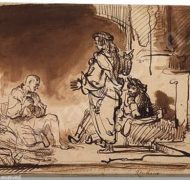Joseph’s Interpretation of Dreams in Prison (Genesis 39:20-40:23)
Bible Commentary / Produced by TOW Project
Joseph’s service in prison was marked by the Lord’s presence, the jailer’s favor, and Joseph’s promotion to leadership (Gen. 39:21-23). In prison, Joseph met two of Pharaoh’s officials who were incarcerated, the chief cupbearer and the chief baker. Many Egyptian texts mention the role of cupbearers, who not only tasted wine for quality and to detect poison but also who enjoyed proximity to those with political power. They often became confidants who were valued for their counsel (see Neh. 2:1-4). [1] Like chief cupbearers, chief bakers were also trusted officials who had open access to the highest persons in the government and who may have performed duties that extended beyond the preparation of food.[2] In prison, Joseph did the work of interpreting dreams for these politically connected individuals.
Interpreting dreams in the ancient world was a sophisticated profession involving technical “dream books” that listed elements of dreams and their meanings. Records of the veracity of past dreams and their interpretations provided empirical evidence to support the interpreter’s predictions.[3] Joseph, however, was not schooled in this tradition and credited God with providing the interpretations that eventually proved true (Gen. 40:8). In this case, the cupbearer was restored to his former post, where he promptly forgot about Joseph.
The dynamics present in this story are still present today. We may invest in the success of another who rises beyond our reach, only to be discarded when our usefulness has been spent. Does this mean that our work has been for nothing and that we would have been better off to focus on our own position and promotion? What’s more, Joseph had no way of independently verifying the stories of the two officials in prison. “The one who first states a case seems right, until the other comes and cross-examines” (Prov. 18:17). After sentencing, however, any prisoner can assert his or her own innocence.
We may have doubts about how our investment in others may eventually benefit us or our organizations. We may wonder about the character and motives of the people we help. We may disapprove of what they do afterward and how that might reflect on us. These matters can be varied and complex. They call for prayer and discernment, but must they paralyze us? The Apostle Paul wrote, “Whenever we have an opportunity, let us work for the good of all” (Gal. 6:10). If we start with a commitment to work for God above all others, then it is easier to move ahead, believing that “in all things God works for the good of those who love him, who have been called according to his purpose” (Rom. 8:28, NIV).





